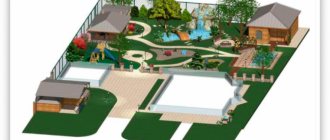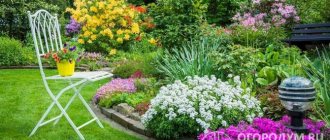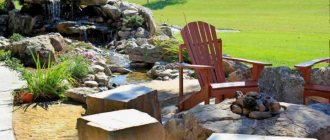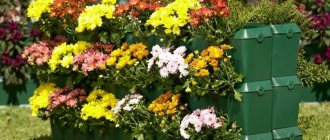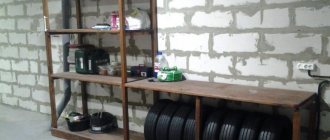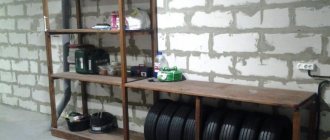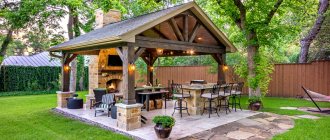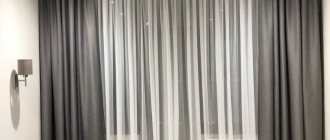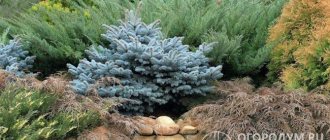Home » Landscape design » Flower beds and flower beds
Vladimir 05/07/2020
69556 Views
Do-it-yourself flowerbeds in the country
The flower garden is a small architectural wonder surrounded by emerald green grass. Flower beds include both single and group plantings, decorative elements, paths, platforms, small architectural forms in the form of sculptures, fountains, etc. Join the fascinating world of landscape design - create a flowerbed at your dacha with your own hands!
Introduction
Based on your wishes, you can create the flower garden of your dreams with your own hands.
Parterre (geometric) flower beds have a symmetrical shape and are usually located in front of the entrance to the building. Open-plan flower beds provide more room for imagination compared to ground floors. They can be designed taking into account the unevenness of the landscape, and installed in a quiet area of the garden, near the pool.
Stone bricks are an excellent solution for zoning
The background for a flower bed, as a rule, is decorative shrubs with attractive foliage colors or small beautifully flowering trees. When creating flower beds, various types of decoration are used: solitaires, rutaria, alpine slides, arches, borders, etc.
Tapeworm is a solitary growing plant that looks spectacular at any time of the year, stands out against the general background of the flowerbed, forming a bright spot. The purpose of a tapeworm is to attract attention. The life of the entire flower garden revolves around the tapeworm.
Dwarf spruce will perfectly cope with the role of tapeworm
For single plantings, use light-loving plants; they can be either annuals or perennials. Among annuals, decorative sunflower, burgundy amaranth, castor bean are good as tapeworms, among biennials - mallow, foxglove, among perennials - queen of shade astilbe, daylily, tree peony.
Variety of mini flower beds
Professional designers distinguish two types of flower beds: regular flower beds and compositions with a free layout. You can choose the following types of regular flower beds:
1. Options that have a strict geometric shape. Round, square, oval or rectangular options are extremely popular.
Beautiful round mini-flower bed
2. Flowerbed made in the form of a strip having a certain width. This option looks great when placed along a fence, veranda or bathhouse.
Mini flowerbed along the fence
3. Parterre-type flower beds. This type involves the creation of a separate composition of flowers, sand or gravel mounds, as well as sculptures.
Parterre-type mini flowerbed
You can choose the option that best fits into the interior of your site. One of the luxurious options is a beautiful mini-flower bed in the shape of a clock. You just need to create a round composition, the edging of which is made of stones, and the flowers serve as hands and a dial.
Original mini flower bed clock
Flowerbed, like from a magazine cover
An enviable decoration for your home
First, decide how much time you can devote to flower beds. If at your dacha there is only a flower garden, and you direct all your strength and energy only to it - this is one conversation, but if there is also a vegetable garden, beds with strawberries, potatoes, tomatoes, cucumbers, a berry garden, there will be very little time left for flowers.
Vegetable bed
Sometimes novice gardeners buy an expensive flower in a single copy, plant it in their flowerbed, and then wonder why the flowerbed doesn’t look as attractive as on the covers of glossy magazines?
Dear flower growers, not all plants, even the most beautiful ones, look impressive individually. Use group plantings to create pops of color in your flower garden. This is a wonderful technique for decorating a beautiful flower garden.
Why isn't your flowerbed like the one on the magazine cover? Read below!
For group plantings, take several plants of the same species in different color shades. You can use annual, biennial and perennial crops.
Look how great the band looks in purple. It contains phlox and daylilies, the queen of the garden - the rose and such a simple but sweet field geranium.
When creating group plantings, choose plants with a long flowering period so that they do not lose their decorative effect throughout the season.
There are some plants that look very impressive before and after flowering. Seed pods and foliage remain on them, and they continue to decorate the flowerbed even after the end of their growing season.
In mixed groups there should be a selection in height, plants should not obscure each other, everything should be harmonious.
Place groups in your flowerbed in tiers . The lower tier consists of ground cover and low-growing plants; they look good near paths and alleys.
Primrose is a great option for the bottom tier of your flower bed.
If you decide to place a group near a tree trunk, then retreat 20 -30 cm. Groups can contain from three to ten plants.
How to decorate the yard of a private house?
Do you want to add a touch of variety to the interior of your own yard? Experts advise resorting to landscaping the area. It is enough to simply build several small flower beds that will become a magnificent decoration.
Mini flower beds are a real decoration of the garden
Do all your buildings create a complete ensemble? Therefore, the mini-flower bed should fit harmoniously into the interior. It makes sense to invite a professional designer to help draw up the project.
Garden project with mini flower beds
The specialist will perform the following actions:
- He will carefully examine the territory to find the most advantageous places to place flower beds.
- He will draw a draft of future compositions so that you can familiarize yourself with the general appearance of the ornaments.
- Will help you purchase and deliver the necessary materials and quality seedlings.
Plan of a parterre-type mini-flower bed
You will get the ideal solution that will allow you to create an oasis of great mood. Beautiful mini-flower beds can become an unsurpassed decoration of any yard.
Floral arrays
Unlike the group, the massif occupies a large area that can extend for tens of square kilometers. Arrays can be plain or variegated.
Suitable for single-color arrays:
- lavender
- phlox
- poppies
- tulips
Floral array of tulips of different varieties
It is not easy to create a high-quality massive planting. It should be harmonious, the colors should complement each other. For example, an array of blue pansies, which are located in the foreground, gradually turning into more saturated blue irises.
Contrasting array without further ado
Creation of contrasting arrays is allowed.
The following options are possible:
- pink phlox and white delphiniums
- delicate white daffodils and bright red peonies
- fiery swimsuit and purple cockerels
Flowerbeds are part of the flower garden
Flowerbeds can be placed in the center of the lawn, along the garden path, around a pool or fountain. They can be oval, round, diamond-shaped or polygonal. Nowadays it is customary to make flower beds flush with the lawn or even deepen them a little.
Play with small architectural forms: statues, fountains
Carpet flower beds made from ground cover plants of various colors in the form of ornaments look very beautiful. It is customary to mulch the soil between plants with sawdust and pine needles.
Vertical flower bed
This form of organizing flower beds can provide a serious service in saving space on the site.
Border
An important element is the border surrounding the flowerbed. The border gives the flower garden completeness. You can also make a “living” border from low, brightly flowering annual plants, such as marigolds or low-growing begonias.
The border neatly outlines the flowerbed, giving it completeness
When selecting planting material, you need to proceed from the following considerations:
1 the plant must be dense and bushy
2all plants must be the same height
3maintain its attractiveness after flowering
4easy to tolerate trimming
5be resistant to temperature changes
Petunia flower border
Options for borders
Annual plants:
- lobelia
- Chernobrivtsy
- low growing carnation
- fuchsia
- cineraria
- brachycoma
Perennials:
- catchment area
- host
- day-lily
- Heuchera
Rabatka
A rabatka is a long strip of land planted with ornamental plants.
Rabatki are good for arranging garden paths and alleys
They highlight the foundation of the building well. As a rule, ridges are not wide up to 2.5 meters.
There is no need to do very long work. If you need to plant a fairly large area, then simply make gaps of half a meter between the ridges.
Plant the gaps with low-growing shrubs: boxwood, spirea.
According to the height of the plants, ridge plants are divided into two types:
1 One-sided - in this case, low plants are planted on the front side of the ridge, then taller ones and, finally, the tallest ones in the background.
2 Double-sided - in this case, tall plants are located in the center, and low plants are located at the edges.
According to the color scheme, discounts are divided into single-color and multi-color.
When creating single-color flower beds, garden plants of the same type and color range are used. In multi-color discounts, you can combine different colors at certain intervals. Multi-colored discounts are more attractive and elegant.
Budget flower beds for summer residents
An inexpensive and quick way to create a flower garden at your dacha with your own hands is to use scrap materials and unnecessary items. Any stones, bricks, pebbles are suitable for decorating flowerbed borders.
They are left natural or painted in bright colors.
A budget option is to use saw cuts or stumps to create a flower bed of annual flowers with a small root system.
This is how you can decorate flower beds with tulips, pansies, and petunias. To make such a flower garden with your own hands, you need:
- Choose a stump or cut that is not rotten or damaged by insects.
- Use a saw or chisel to make a recess in it, leaving 5 cm around the circle untouched.
- Coat the wood with an antiseptic compound.
- Make drainage in the form of drilled inclined holes on the walls. Place a layer of gravel on the bottom.
- Fill the structure with soil and plant the selected plants.
Video instruction:
Other wooden products are also suitable for decorating a flower garden - pegs, logs, sawdust, branches. For example, you can weave baskets from willow branches and use them as containers for flowers.
In much the same way as from a stump, you can create flower beds from various old things - carts, boats, cars, cages, TVs, barrels, any damaged furniture.
If the area of the summer cottage is small, then small flower beds can be made from a watering can, suitcase, old bags, bottles, glass or plastic plates.
A painted car tire makes a bright flower bed, and boxes and pallets make the basis for creating a multi-tiered flower garden.
Beautiful combinations of flower beds
Beautiful flower beds are obtained by using interesting combinations in the composition not only of plant varieties, but also:
- by color - gradient, contrast, similar shades;
- in form - smooth chaotic lines, strict geometric shapes, ornaments;
- additional elements.
You can successfully play with a variety of objects, making them the central element of the flower garden, its base or border. These can be the already described budget options or, for example, a bridge, a garden fountain, a bench around which flowers are planted.
Volumetric flower beds always look beautiful. To create them, taller flowers are planted in the center, then lower ones, and ground cover varieties are planted at the edges.
Alyssum
Such a flowerbed can be made in an old tire, barrel, or box. By analogy with size, you can use another plant parameter - color: plant dark blue flowers in the center, then blue, and white at the edges.
Primrose and irises in a flowerbed
An interesting option is a stone garden . This is the name of a flower garden that is grown on stones. They are fixed with lime mortar or laid out on a designated area randomly or in accordance with a pre-planned pattern.
Plants, edible greens, and herbs are planted in the spaces between the stones. Often such compositions are complemented by shrubs and trees, especially if a rather large area is allocated for the garden.
Assortment of plants for an attractive garden
Annuals:
- Chernobrivtsy
- petunia
- brachycoma
A flower bed of ground cover plants along the garden path
Biennials:
- pansies
- daisies
- rose stem (mallow)
It is not easy to create work from perennial plants.
Varietal composition for perennial ridges:
- low growing aster
- tree peony
- delphinium
- day-lily
- Heuchera
- small petal
Roccary
This type of flower bed is rightfully considered one of the most beautiful ways to decorate a flower bed; in appearance, such a flower bed resembles an alpine hill.
Also, a flower bed can be made not only from flowers, but flower beds are also made from stones.
Mixborders
Combined mixborder along the fence
Mixborders are multi-row flower beds of ornamental plants . The plants are selected so that when some fade, others immediately bloom, and the mixborder remains attractive throughout the season.
A flower bed that is attractive in the off-season is the pinnacle of a florist's skill
Mixborders are often placed along buildings, on lawns, and near swimming pools in the form of bright color spots. The edges of the mixborder are limited to lawn grass or laid out with tiles, stones, and stump cuts.
Perennial cereal grasses look beautiful in mixborders
The selection of plants should be such that the flower garden will be a decoration throughout the entire summer season. For mixborders, annuals and biennials are used, but the main place, of course, belongs to perennial plants.
Use pebbles to fill empty spaces between plants
The background for a mixborder can be:
- pampas grass bush
- tree peony
- barberry
- dogwood
- small beautiful flowering tree
Combined mixborder along the fence
A variety of flower beds that can be arranged near the house
There are several concepts that describe decorative plantings of various shapes on a plot of land:
- Flowerbeds are plantings of plants that have a specific shape or are fenced with decorative fences. They come in the following types: free or regular, created from annual or perennial plants, shrubs, and trees.
- Mixborders are plantings along paths or fences. In this case, plants are selected according to their growth and flowering time, which allows them to have a spectacular appearance throughout the warm period of the year.
- Parterres are rectangular flower beds that occupy a central place. The plants here are planted in certain contrasting combinations.
- The ridges are created in the form of a strip along the edging of the paths. Flowers create a bright ornament; low-growing crops are used.
- Front gardens are used to create an attractive view of the house, which is visible from the driveways. From the entrance to the house to the gate to the yard, the arrangement of flower beds and single plants that attract attention is planned.
Flowers of various types and colors can “settle” in a flower bed Source pinterest.com
To create beautiful flower beds, you need to take into account the possibilities of viewing them. For example, round flower beds are clearly visible from any side, while flat ones are better visible from a hill. When placed vertically or horizontally, advantages are emphasized, space is expanded, and so on.
A round flower bed, its design can resemble a shield Source idei-dekoru.com You can also decorate the walls of your house with flowers Source nl.pinterest.com
See also: Catalog of companies that specialize in landscape design of sites.
Alpine slide
This is a miniature rock garden. The main task when constructing a rock garden is to ensure that it fits organically into the landscape . It is worth remembering that this style of garden art originated in ancient Japan.
The Japanese, above all, value harmony and peace
Alpine slides have gained unprecedented popularity in our time. Apparently our people lack quiet contemplation of natural beauty.
Making a good rock garden is not as easy as it seems at first glance
Planning should proceed in several stages. First of all, it is necessary to organize there is natural planning; it, as it were, stylizes the motifs of the mountain landscape.
- Choose areas with a slope or terraces.
- First, drainage is done, because mountain plants do not tolerate stagnant water.
- The top layer of soil is removed, buried 20–25 cm, crushed stone or broken brick 5–10 cm thick is laid.
- The stones should be matched in color and laid parallel to the surface of the site; stones should not be piled up chaotically.
- Use sandstone, limestone, granite, natural stones. Avoid regular shapes and right angles.
- The stones need to be installed firmly, because in the future it will be possible to move along them, weeding and loosening the rock garden.
- Fill the space between the stones with decorative pebbles or mulch with large sawdust and pine needles.
Stones are an integral part of the alpine slide
Install the stones firmly, you will have to climb on them while weeding the alpine slide
Laying a rock garden
If the plants you plan to plant like acidic soil, add peat chips, and if they prefer alkaline soil types, then you need to lim the soil with lime.
It is not recommended to use manure and large amounts of nitrogen fertilizers, as the plants will begin to vegetate wildly, this will give them an unusual appearance, they will stretch out, become unstable to diseases and lower temperatures.
In addition, manure can contain a huge amount of weed seeds, and as you know, weeds are the worst enemies of flower beds.
Early flowering crocuses take pride of place on alpine hills
In the first 2 - 3 years you can not apply fertilizers at all; in subsequent years you need to add a little superphosphate.
The range of plants used for alpine slides is very wide
Cereals:
- ground cover plants
- all kinds of bells (Carpathian bellflower, Campanula angustifolia)
- Heuchera
- looked younger
- bloodroot
- saxifrage
- savory
- lavender
From early flowering plants you can plant:
- crocuses
- saffron
- decorative bow
- hazel grouse
- hyacinths
Single growing ferns will look beautiful.
Among the shrubs there are many attractive low plants that are suitable for decorating an alpine slide:
- barberry
- heather
- rhododendron
- low growing spirea
- euonymus
- boxwood
Sedum and young - a standard set for a top-end rock garden
Coniferous plants look beautiful: decorative low-growing Christmas trees, pines, yew, juniper.
Decorative fencing made of wooden pegs
For a summer cottage, a great idea would be to decorate a flower bed using wooden pegs. In summer cottages you can often find broken branches of trees, which are suitable for blocks with which you can make a flower garden fence.
Perennials in flower beds
Take care to get the greatest effect from the least amount of labor. There is a way out - these are perennial plants. Even at the planning stage, allocate space for a flower bed.
If you expect that the flowerbed should be visible from the window of the house or from the gazebo, do not hide the flowers away from recreation areas . It is up to you to create a flowerbed of any shape - round, with right angles, in the form of diverging rays.
Perennial plants are a good choice for mixborders
Perennials look very beautiful as part of mixborders - these are prefabricated flower beds. They are usually organized along garden paths or along fences.
Perennial flowers are demanding of sunlight, under the canopy of trees, in the twilight they turn yellow, stretch out, and lose their beauty
Mixborders can be placed next to perennial fruit trees and berry bushes.
When laying a mixborder, keep in mind that its width must be at least two meters, otherwise the attractiveness will be reduced.
Selection and combination of plants
One of the main parameters for choosing plants for a flower garden is their height.
Tall varieties cannot be allowed to overlap the others, so they are usually planted in the center of the flowerbed or in the background.
Scheme of a flowerbed of perennials
It is better to start choosing with those varieties that will form the basis of the composition and will be its accent. These are not only tall species, but also all large and bright flowers. Then they choose background plants that complement the main ones, and also fill empty spaces and give shape to the flower garden.
When choosing a flower garden design style, it is advisable to take into account the design of the surrounding area. In terms of color, you can use both monochromatic compositions and contrasting ones. Their combinations also look beautiful.
For example, blue flowers are often lost against dark foliage. But they can be highlighted and made bright if you place plants with yellow flowers nearby.
Delphiniums in the center of the flowerbed
Some species do not combine with each other, so it is not recommended to plant them in the same flower bed. The following combinations are bad:
- peonies with any shrubs, such as roses;
- carnations and roses;
- dahlias and any cultivated plants - these flowers are used for monobeds.
And buttercup plants (anemone, delphinium, buttercup) need a lot of moisture, so any type of moisture-loving flowers does not grow well next to them.
How to preserve flower beds in the heat
Typically, flower beds are filled with plants that need the same watering regime. Therefore, they tolerate heat equally. To preserve the vitality of flowers as much as possible on such days, it is better to water them abundantly, but rarely, for example, once a week. Drip irrigation is also effective.
Drip irrigation Gardena
It is better to postpone fertilizing, as it stimulates plant growth, which requires even more moisture, which is scarce in the heat.
You can think about this issue at the stage of planning the design of the territory and organize a flower garden in a shaded place, for example, under trees. But you will also have to use shade-loving flowers for it.
Soil preparation
It is advisable to prepare the soil 3 to 5 weeks before planting flowers in the flower bed
- Provide good drainage. Standing water negatively affects the physiology of flowering plants.
- Perennial plants can go into a state of suspended animation due to waterlogging.
- There must be air in the soil, the soil must be moisture-absorbing and fertilized.
- If there are a large number of weeds, you need to remove them, dig up the ground, and get rid of the roots of perennial grasses, especially the rhizomes of creeping wheatgrass.
- Organize drainage, lay it to a depth of a couple of bayonets of a shovel.
- Compost, humus, and peat chips have a beneficial effect on the quality of the soil.
- If your site has clay soil, you need to add sand and half-rotten sawdust.
Planting flowers in a flower bed
The best time for planting flowers is spring, and for bulbous and early-flowering perennials, autumn
1Irises should be replanted after they have flowered, this is the most favorable time, they are at rest, and after a month and a half they begin to grow a new root system.
2When planting perennial plants, remember that the planting holes should be such that the plants can easily spread their roots into them.
3The depth should not be excessively large; the best option is when the lump is completely located in the new hole.
4Freshly dug soil around the planted plant should be compacted, eliminating voids in the area where the root system is located.
5It happens that after the first watering the soil sags; in this case, add fresh soil.
6Leave a small depression to make it convenient to water the plant.
Stone for flowerbed decoration
In the photo of a decorative flower bed you can often see how it limits the area around a tree or fountain. A decorative stone for flower beds, which is laid out randomly or along clearly defined lines, helps her with this. Stone is a natural material and it is in harmonious combination with plantings of plants and flowers.
Stone fencing has a number of advantages:
- they protect the ground from the effects of precipitation and the flowerbed is not destroyed;
- add a unique flavor to the design;
- an island made of stone fencing blends harmoniously with architectural structures;
- limits flowers from growing;
- does not require updating or maintenance;
- easy to do with your own hands;
- You can create any design.
Flower beds, limited by decorative stone, can be either small in size or placed over large areas. The only downside to using stones and boulders is their weight and difficulty in transporting, as well as their cost if it is a valuable rock.
Note!
Do-it-yourself decorative fence on a summer cottage - a review of modern ideas (112 photos of new designs)
Plot of 6 acres: TOP-140 photos of ideas for planning and landscape design of a summer cottage
Trellis for grapes? do it yourself - ready-made solutions for the garden plot. Instructions + 120 photos of options for the correct trellis
Watering
The best time to water is early morning
In summer, perennial flowers need to be watered often and in large quantities. If they lack moisture, they will bloom poorly and will not have the desired aesthetic effect.
Do not water the plants on the leaves, pour water directly under the roots, this way you will avoid the spread of powdery mildew.
Do not forget to remove faded branches, inflorescences, and leaves that have lost their attractiveness. Try to keep your flowerbed decorative for as long as possible.
Layout
Perennials are grouped by growth, flowering time, color, and type of leaves. Choose plants that are not particularly labor-intensive to care for.
Moderately labor-intensive perennials include:
- astilbe
- aster
- geranium
- primrose
- brachycoma
- cloves
- sedum
Foxglove requires virtually no care
Among the unpretentious ones the most popular are:
- monarda
- stock-rose
- digitalis
- lily of the valley
- digitalis
- lavender
- phlox
- lovage
Formation of compositions
When arranging flower beds, assume that the main colors are red, blue and yellow.
Flower beds with plants of the same color, but in different shades, look beautiful
Green, purple, and blue flowers look beautiful in the foreground. Cool shades are perceived better up close, because the further they are located, the less impression they will make and will merge with the surrounding landscape.
Also, when creating flower beds, use white color, plants with silver foliage, they look very impressive and, as it were, soften the impression of contrasting neighbors. When creating flower beds, the emotional side is very important, how the plant is perceived by us, people.
The aesthetic side is one of the most important in creating flower beds
Look at the peonies, how luxurious they are, large, majestic, covered in drops of dew, almost the size of a saucer, heavy with the abundance of petals. Forget-me-nots and viola will look beautiful next to peonies.
It is necessary to plant these crops in the most accessible places in your garden; peonies have few competitors that would look so decorative. Projects of two-story houses Z500 https://z500.com.ua/doma/poisk/dvuhetazhnye-doma.html on the official website https://z500.com.ua
Peony bushes need space and green lawns
In early spring, the burgundy sprouts of these flowers look attractive and elegant. After flowering, the bush keeps its shape for a long time and even in autumn pleases with its yellow, red and brown colors, standing out against the background of the lawn and shrubs.
Aromas and leaf shapes
When choosing flowers for a flower bed under a window, it is important to focus not only on the shape and names of the flowers, as well as their flowering period, but also on the aroma that creates a special atmosphere. The aromas of plants are best felt in the evening and at night, and when the window is opened, they fill the interior space of the room, creating a cozy and romantic atmosphere. In this regard, to decorate a flower bed, you can use low-growing flowers, for example, fragrant violets, after which you can add larger flowers (paniculata phlox, daylily and peonies). Also, to decorate a fragrant flower bed, you can use yellow echinacea and fragrant lavender, which can be combined with other flowers or create an original mono-flower bed.
An equally important criterion is the shape of the leaf, because plants with decorative leaves can become a real decoration of the area near the window. To design a flower bed, you can use plants with delicately cut foliage or large leaves spreading in different directions. For example, hostas go well with astilbe, bergenia, narrow-leaved daylilies and irises. You can create an original flower arrangement by planting white astilbe surrounded by hostas arranged symmetrically.
Primroses
One of the first flowers after the snow melts
- Bulbous flowers evoke tender and tremulous feelings; these are the first flowers after winter that we have been waiting for for so long.
- They look touching against the backdrop of the remnants of snow; they should be placed closer to paths and garden paths so that you can admire them.
- Make sure your garden looks decorative from early spring to late autumn. Yes, it's difficult, but possible.
- Take into account all the features, remember that early flowering plants are usually short, so they will need a good background to highlight their beauty.
- Use boxwood bushes, low-growing thuja or juniper as a background.
climbing plants
In flower beds, climbing plants are located on supports, usually in the center
- Lianas and climbing plants are always welcome guests in the garden. They are distinguished by rapid growth of shoots, carved foliage, numerous flowers, and sometimes attractive fruits.
- To achieve maximum beauty, you need to use supports and create an appropriate background.
- Use combinations of contrasting colors, for example, clematis can be planted in dark purple and white.
- The supports should be comfortable and easy to use.
- Climbing plants can decorate lamp posts and unsightly buildings.
Wicker fence
A decorative wicker fence, woven with your own hands, will add originality to the garden and help save money - a fence created by yourself costs absolutely nothing.
It is best to weave a fence from a vine, but you can use other flexible branches left after cutting down trees and bushes. Birch decorative barriers look very expressive. The height of the wicker fence should be approximately 0.4-0.6 meters.
The base of the fence is made from long, thick branches of willow or grapevine. First of all, pegs are placed around the perimeter - in the corners and along the walls. A frame is woven between the pegs to create a fairly dense fence. Very long branches are trimmed. Secure the walls with corner clamps.
Wicker fences for flower beds are ideal for naturalistic and rustic gardens, perfect for decorative flower beds of roses, tall plants, and ornamental grasses.
Planting a flower bed - step-by-step instructions
- First of all, you need to draw up a project, make a breakdown, plant plantings. And of course, provide constant care.
- You can make a planting drawing yourself on a piece of paper, or you can use computer programs for landscape design.
- Here is a list of some computer programs for creating flower garden designs.
- After creating a flower garden, you need to write a statement that will contain information about the varieties, hybrids, plants planted, the quantity, and frequency of planting.
- Before planting, it’s a good idea to familiarize yourself with the biology and agricultural techniques for growing certain crops.
- Place flowers taking into account their size, so that they do not block the plants behind them. Consider flowering time.
- If you follow all these rules, the flower garden will look beautiful and attractive from early spring to late autumn.
- Next to bulbous plants that will flower early, tall perennial plants can be provided so that they cover bald spots.
- Once you have finished laying out all the elements in your flower bed, till the soil.
- Don't go beyond the boundaries you set.
- Remove the roots of weeds, especially the rhizomes of creeping wheatgrass, stones, and other debris.
- In case of severe soil contamination, imported soil must be brought in. Remove the top 25 cm layer of soil, fill the vacant space with a specially prepared soil mixture of humus and rotted leaves.
- You can start planting cold-resistant plants in early spring; do not be afraid of frost.
- Start planting heat-loving plants in late May.
- To prevent you from trampling the ground, use boards and stands.
- Planting should be done starting from the center of the flowerbed and gradually moving towards the edges.
- Do not forget that the flower garden must be constantly cared for, only in this case it will look aesthetically pleasing.
- Ensure timely weeding and loosening.
- Faded inflorescences and dry leaves must be removed.
Provide timely watering, and the plants will thank you with lush flowering
- If the summer is especially dry, watering should be done in the morning and evening; watering should not be done during this time.
- Feed the plants with fertilizers three times: in early spring, during bud formation, and during flowering.
- Apply ammonium nitrate, phosphate and potassium fertilizers.
Fashionable and original solutions for designing flower beds
Ordinary pots and flower beds can be revived and transformed with the help of unusual ideas. Decorative flower beds can be made from all kinds of available materials. For this you will need:
- tires
- old stumps,
- tree trunks
- old furniture
- old buckets and watering cans
- plastic bottles.
Shoes can become very fun flower pots; you just need to fill them with soil and plant flowers.

